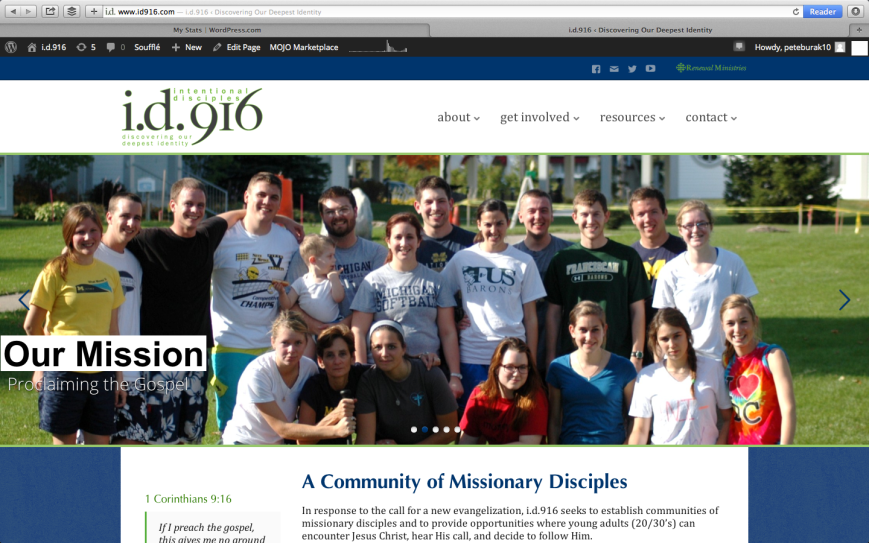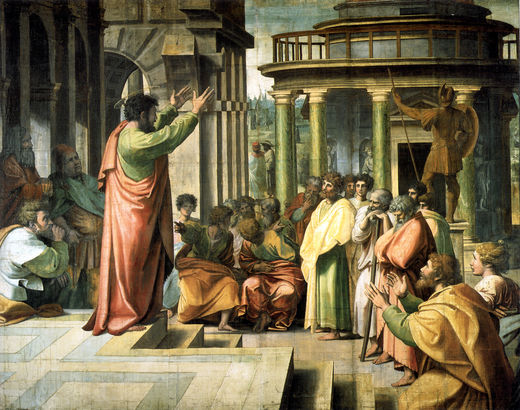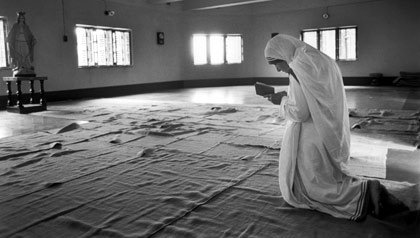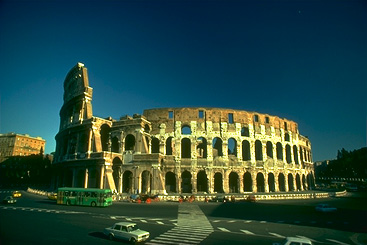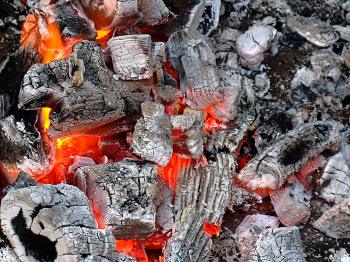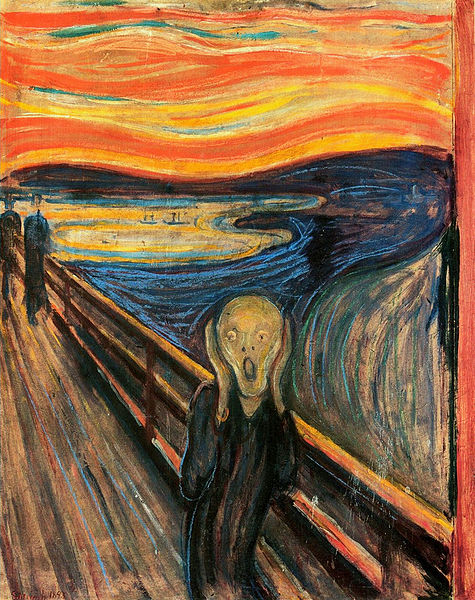We are excited to launch the new i.d.916 website! It’s an excellent source for more information on i.d.916; our mission, vision, growth, and resources.
Category Archives: 4 Pillars of Discipleship
Gotta Let It Burn…
 Question: What does a fire do?
Question: What does a fire do?
Most people don’t ever see a real fire burning real logs anymore, which is a shame. Besides the obvious niceties, seeing, smelling, hearing and feeling a fire can also teach us a lot about life with the Lord. Like all of creation, fire teaches us. It points us to our Father (it is our Father in a certain sense) and speaks of what lies behind the thin material veil before us. Look at a fire and you will glimpse what God is about.
Answer: a fire purifies and it transforms. Listen to St. John of the Cross:
Fire, when applied to wood, first dehumidifies it, dispelling all moisture and making it give off any water it contains. Then it gradually turns the wood black, makes it dark and ugly, and even causes it to emit a bad odor. By drying out the wood, the fire brings to light and expels all those ugly and dark accidents that are contrary to fire. Finally, by heating and enkindling it from without, the fire transforms the wood into itself and makes it as beautiful as itself. (The Dark Night)
A fire does not tolerate the impurities of a piece of wood. It puts it through a period of cleansing and refinement. It changes it; makes it pure by making it purely wood, without any of its original imperfections. This is not simply an end in itself but so that the fire can transfigure this dead piece of wood into itself – something it could never have done for itself.
Is this not what God does for us?
Our God comes, he does not keep silence, / before him is a devouring fire, / round about him a mighty tempest. / He calls to the heavens above / and to the earth, that he may judge his people: / “Gather to me my faithful ones, / who made a covenant with me by sacrifice!” (Psalm 50:3-5)
Though as dead as a piece of wood in our sins (Eph. 2:5), mixed through with soot and covered in barnacles, the living flame of the Lord engulfs and mercifully purifies us. He doesn’t tolerate the evil that sullies us. He wants to destroy it, annihilate it, burn it away. This simple fact should blow our minds: if we stick close to Him, He promises to make us 100% pure and whole – free from all that clings to us and steals our happiness.
It will hurt. It will come through suffering. It will involve a painful detachment and uprooting. For this reason, it is only with a great deal of either naivety or courage (hopefully the latter) we can pray one of those highly consequential prayers, “Lord, kindle in me the fire of your love.” His love is a fire – and it burns.
Therefore let us be grateful for receiving a kingdom that cannot be shaken, and thus let us offer to God acceptable worship, with reverence and awe; for our God is a consuming fire. (Heb. 12:28-29)
What is this purification for? Transformation.
We bear a tremendous inner poverty akin to a dead piece of wood, but once purified of all that keeps us from accepting the life (the flame) of God, we can be ignited by the spark of His Love and transfigured into an amazing, heat-giving, light-giving fire! We are transformed into a royal priesthood: able to offer ourselves up as living sacrifices billowing up to Him. And in this sacrifice – in this gift of self – we find abundant life, joy, happiness, peace and glory.
In this context do St. Paul’s words blaze and combust:
I appeal to you therefore, brethren, by the mercies of God, to present your bodies as a living sacrifice, holy and acceptable to God, which is your spiritual worship. Do not be conformed to this world but be transformed by the renewal of your mind, that you may prove what is the will of God, what is good and acceptable and perfect. (Rom. 12:1-2)
Now the coup de grâce: this purification (i.e. deeper conversion) and transformation wrought by the fire of God inevitably and inescapably leads to mission. A fire that is really aflame is always felt and seen by others. In fact, if left to its natural course and habitat, a fire that is really burning will pass its heat along – it will ignite others as well! A flaming log doesn’t keep to itself, but shares what it has received with others. It is set aglow with dazzling light. And what is set aglow is meant to be seen.
Thus, disciples burn. They burn with the holy, engulfing, beautiful fire of God. They are purified, made whole, transformed and then sent like wildfire to bathe the whole world in this vibrant glow.
Brothers and sisters, let’s be disciples. Let’s look into the fire of God’s love with trust! We must understand that it comes to purify, to heal, to enlighten and to transform. And then, let us not be afraid of the flame we have been given, but instead go forth into the world in the confidence of God’s power.
For this we pray, “Come Holy Spirit and kindle in us the fire of your love!”
Now go make a fire.
Scriptural Postscript: pray with 1 Peter 2:9; Revelation 1:6, 5:10; Titus 2:14; Romans 12:1; Psalm 119:4; Hebrews 12:28. Also, pray with this song Fuego De Dios by Hillsong United.
Can I Get Some Simplicity for God’s Sake! (Part 2 of 2)
 While Part 1 of these tandem posts focused on simplicity of life, it ended with a whisper of something more. Without this ‘something more,’ this practical simplicity of life is incomplete, akin to dry ritualism, “drudgery for the sake of it and an insult to all men of good will” (A Christmas Carol.)
While Part 1 of these tandem posts focused on simplicity of life, it ended with a whisper of something more. Without this ‘something more,’ this practical simplicity of life is incomplete, akin to dry ritualism, “drudgery for the sake of it and an insult to all men of good will” (A Christmas Carol.)
We don’t empty ourselves as an act meaningful in and of itself. It is in service of a deeper kind of simplicity. Let us boldly assert what is, in truth, a rather queer fact: we empty ourselves to be filled! Our situation matches what we find in reality: we are in need of filling and (alleluia!) there is something that waits to fill us.
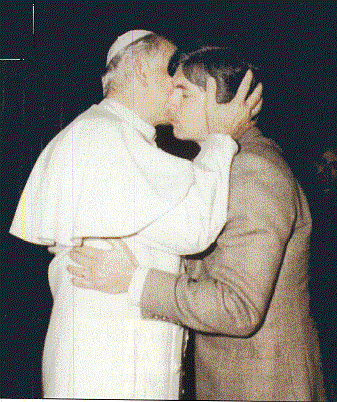
But with what do we need to be filled?
In 1995, a year after writing his prophetic, profound and highly praised book, The Catholic Church at The End of An Age: What is the Spirit Saying?, Ralph Martin traveled with Sr. Ann Shields to Rome to meet with Pope John Paul II. At their meeting, Ralph presented to him his new book. The Holy Father rhapsodically whisked the book out of Ralph’s hand, blindly reached back to hand it to his secretary, and said, “Ralph, I have already read your book!” Placing his outstretched hands on Ralph’s shoulders, his face grew fiery, his eyes locked and his voice lowered as he said, “Tell me, Ralph – what is the Spirit saying…?” Sr. Ann Shields recounts how, as both men looked into each other’s eyes, Ralph simply answered, “Jesus.” And the two men – two disciples, two children of God, two pilgrims longing for home – repeated back and forth to each other, “Jesus… Jesus… Jesus…” as their voices tailed off.
When we simplify our lives and empty ourselves of the clutter, we open ourselves to being filled more with the Holy Spirit – “The Lord, the Giver of Life”: God Himself. And when the Spirit fills our hearts, like a silent bolt of lightning suddenly illuminating the darkened sky, it points and bears witness to one, simple thing: Jesus.
 Oh how badly we need (and desire!) this deeper kind of simplicity. We run around and chase so many causes (pro-life/pro-choice), philosophies (expanded/limited government), worldviews (“just love people, dude”) and lifestyles (“P90X and a gluten-free diet changed my life!”), when all we need is more of Him. Please don’t misunderstand – causes, philosophies, worldviews and lifestyles are all legitimate parts of life. But, they are secondary. Jesus is primary. We must come to grips with this, because we are forever in discord until we put first things first and second things second (as pointed out with customary brilliance by Lewis in God in the Dock).
Oh how badly we need (and desire!) this deeper kind of simplicity. We run around and chase so many causes (pro-life/pro-choice), philosophies (expanded/limited government), worldviews (“just love people, dude”) and lifestyles (“P90X and a gluten-free diet changed my life!”), when all we need is more of Him. Please don’t misunderstand – causes, philosophies, worldviews and lifestyles are all legitimate parts of life. But, they are secondary. Jesus is primary. We must come to grips with this, because we are forever in discord until we put first things first and second things second (as pointed out with customary brilliance by Lewis in God in the Dock).
To be human means to look for meaning and purpose in your life as a whole and in your everyday activities. We are all on this search. And as we journey, we accumulate so many things that serve as our guiding lights, giving us meaning and purpose. But are they not all doomed to disappoint us, these dressed-up finitudes to which our hearts aren’t built to belong? We are called to a radical simplicity, to a singleness of purpose.
This simplicity, this singleness of purpose always breeds excellence (see Rediscover Catholicism, Matthew Kelly), whether be in secular tasks or on the spiritual journey.
We see clear-cut evidence of this in Pope John Paul II. He was a man of tremendous gifts – a philosopher, mystic, sportsman, intellectual, dramatist, statesman and leader, but who can best be understood in a “simplicity that lies on the far side of complexity” as a “radical, Christian…disciple” (Witness to Hope, George Weigel). Though life is complicated and our participation “in the world” produces myriad currents of interest, involvement and activity in our lives, at the bottom of that ocean – at the bedrock foundation that lies on the “far side” of all that complexity – what sits on the throne of our heart? Does Jesus sit there? Do we live for a singular purpose?
For I decided to know nothing among you except Jesus Christ and him crucified. (1 Cor 2:2)
But whatever gain I had, I counted as loss for the sake of Christ. Indeed I count everything as loss because of the surpassing worth of knowing Christ Jesus my Lord. (Phil 3:7-8)
At the end of the day, after being filled with the Spirit, they had this deep simplicity. Their meaning and purpose didn’t come from their jobs, their bank accounts, their houses, their projects, their vacations, their ‘experiences’ or even their web of relationships. Life was about one thing and one thing only: Jesus, Jesus, Jesus.
This kind of simplicity is radical and deeply counter-cultural. Our (now, global) culture is a culture of stuff. You have an itch (boredom)? The culture has a thing for that (TV, Netflix or another form of entertainment). Now a different itch (nope, boredom again)? Well, it has something else for that, too (big ‘experiences’). We take a little bit from here and little bit from there, accumulating these void remedies until eventually we end up bloated on a bunch of solutions that just create more problems, less peace and don’t satisfy anything. We resolve ourselves to living these fragmented lives when “only one thing is needful.” Why?!
Do we really believe that Jesus is all we need; that we need nothing else; that the kind of life He would give us is the life we actually would quit everything to have? Every saint answered ‘yes’ to those questions – and then lived a ‘simple’ life that confessed only one thing: Jesus.
All of us can feel convicted by this. What this really boils down to is a lack of conversion. We simply need to have more deeply converted hearts. Let’s put ourselves in God’s hands, in prayer, and ask Him for that. He’ll answer.
In our complicated, bloated, materially obese culture, we need a greater simplicity of life and a more radical simplicity of heart. And the Good News is that the King is ready and waiting to grow these in us! Let us come before Him so that we may…
Remain simple and innocent, and [we] will be like little children who do not know the evil that destroys man’s life. (CCC 2517)
In this way we will contradict our generation. But, paradoxically, it needs us to do just that.
Can We Have Some Simplicity for God’s Sake! (Part 1 of 2)
 A recent blog post quoted Chesterton on the topic of ‘fitting in.’ His unconquerable wisdom showed us how, oddly enough, each generation is converted by the saints who contradict it the most.
A recent blog post quoted Chesterton on the topic of ‘fitting in.’ His unconquerable wisdom showed us how, oddly enough, each generation is converted by the saints who contradict it the most.
An interesting question follows: in what ways does our generation and its attendant culture need to be contradicted the most (i.e. what would the life of a ‘saint’ life look like today?) Yes, there are quite a few answers to that question. But let’s propose just one here today.
It doesn’t take long – in the more reflective moments of reading about ages past or asking old family members things like, ‘What’s changed the most since you were a kid?’ or just pondering one’s weekly schedule – to realize a fact that is so darn obvious that we often fail to see it: our times are characterized by overwhelming, nearly dictatorial, complexity.
This takes next to no convincing at all. Consider the mountain of legal, economic, electric and mechanized structures that have to be established and maintained for you to simply drive to work in the morning. And this daily activity is just one example. The things that make up the fabric of our lives are like a thick forest. Man has indeed invented many things to make life easier and more comfortable, but if we raise our heads just a little and take in the sum total of that criss-crossing web of systems and stuff, it nearly blots out the sun. It is a many-tentacled juggernaut that creates an awful lot of mental, physical and spiritual noise in our everyday lives.
(An aside: If anyone doubts this, I challenge you to spend a week in the mountains with nothing but necessities and see if you don’t experience a preliminarily distressing withdrawal that gives birth to an emancipating levity.)
Unprecedented worldly complexity is surely a sign of our times. But, can it drag us away from God? Can it affect us interiorly? Well, why not give the floor to Jesus and see what He has to say on the matter (it’s usually pretty good.)
Martha, Martha, you are anxious and troubled about many things; one thing is needful. (Luke 10:41)
Blessed are the pure in heart, for they shall see God. (Matthew 5:8)
Jesus’ words themselves are not complex, nor do they counsel complexity. Yet, they are a deep ocean of refreshing riches. Let’s dive in.
What is purity of heart? It is emphatically not to be conflated with chastity. It is much more than what we often refer to as ‘purity.’ Purity of heart means a singleness of purpose (like a heartbeat), a decontaminated desire that sets its sights on “the one thing necessary” and Him alone. It means to will only one thing. In this sense, purity means oneness and wholeness. Just as pure water has nothing in it except water, so the pure in heart have no dust particles clouding their line of vision to God. Thus, a pure heart is a simple heart.
Again the objection could arise: this is internal, spiritual simplicity – what does external, material simplicity have do with that?
One of the great sages of our time, Peter Kreeft, in one of his lesser known books on the moral life has an obscure chapter entitled “Simplicity” that asks this very question. He responds like so:
Because external simplicity is very closely related to internal simplicity, to the “purity of heart” Jesus calls for. A simple lifestyle is a powerful aid to a simple heart. It aids simplicity of heart for the same reason bodily kneeling aids humility of spirit in prayer. Our spirit learns from our body…In other words, here is the fundamental argument: If you have simplicity of life, you will probably have simplicity of spirit. If you have simplicity of spirit, you will be a better person. Therefore if you have simplicity of life, you will probably be a better person. (Pg. 148, Making Choices)
For this reason, Kreeft argues against living in the grasp of the “tentacles” of the “octopus [that] is our modern society”, which is full of “dark ink” and “strangling” tendencies. How? Through simplicity:
I do not counsel flight but fight; not running away from the complex octopus of modern society but using the tentacles of the octopus without being used by them, swimming in and out freely. Simplicity is the oil that greases our backs and prevents the octopus from grabbing hold of us. (Pg. 149, Making Choices)
So, if this complexity is the texture of our world today, and if that complexity can, as Kreeft posits, pull us away from the Lord, what are we (keeping Chesterton in mind) as disciples of Christ to do?
As always, the apparent truth is at once convicting and vivifying: Perhaps we need to simplify our lives.
How? Kreeft has life-changing suggestions (that I won’t explain, you should seriously read this chapter – it’s marvelous):
– Taking back time by doing timeless things
– Sleeping closer to the sun’s schedules
– Living a poorer (which is, paradoxically, richer) life with less ‘stuff’
– Taking more time for silence (and the things silence produces)
– Instead of buying so many things, make them yourself
– And many more…
In this short post, we need not fuddle with how we should simplify our lives. Obviously the method and expression of this simplicity will be different in each person’s life.
But, one thing is clear: we need to get real with ourselves. We all (especially living in this country) can think of two (probably ten) things that we fundamentally do not need, yet we rely on as ‘innocent’ little titillations and diversions. Kreeft, again, has exacting words:
Whether you take the particular pieces of advice in this chapter or not – e.g., whether or not you put the TV set in the attic – you should be able to do so. If you simply can’t, then the octopus has captured your heart and you are an addict. In that case you probably need to “go cold turkey” and free yourself by taking an axe to your slave master, destroying your drug.
And isn’t that the very chord this sort of tune comes down to: freedom. Taken further, freedom to see God. Amidst all of the clutter of our world are we free to gaze upon and really know He who is everything we love? (Aside: this earthly, infant version of the beatific vision is what St. Thomas Aquinas called the foundation of happiness.) Are we free to know (be united to) He whom we love? Or do thick, noisy clouds of dust muddy our vision? If so, as a statement of fact, these clouds are our enemies and we ought to set them aflame. No doubt such simplicity, such radicalness, such purity of heart would revolutionize Christian culture and the world.
Perhaps it is for these reasons the Catechism encourages us to…
Remain simple and innocent, and you will be like little children who do not know the evil that destroys man’s life. (CCC 2517)
… and why Mother Teresa confessed:
My secret is very simple: I pray. (No Greater Love, Mother Teresa)
Forget ‘Fitting In’
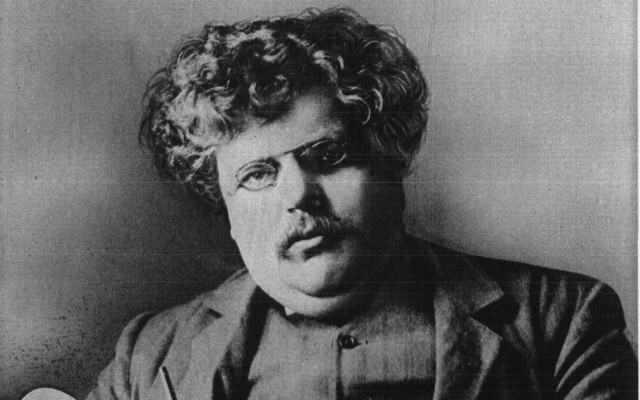 In the beginning of G.K. Chesterton’s deftly illuminating biography of St. Thomas Aquinas lies this thought:
In the beginning of G.K. Chesterton’s deftly illuminating biography of St. Thomas Aquinas lies this thought:
Christ did not tell his apostles that they were only the excellent people, but that they were the exceptional people; the permanently incongruous and incompatible people; and the text about the salt of the earth is really as sharp and shrewd and tart as the taste of salt… Therefore it is the paradox of history that each generation is converted by the saint who contradicts it most.
Like most of Chesterton’s writing, that quote comes at us like an unforeseen stiff jab; it’s odd, jolting and strangely awakening. When we try that passage on like a t-shirt we see that at once it scratches and challenges us, but, simultaneously, somehow it fits perfectly.
From adolescence to our twilight hours, we get so anxious about ‘fitting in’ and ‘finding our place’ in the world. We try to find our group – our place of connection and belonging. We have last names that contextualize our lives in a ‘clan’, we buy t-shirts that manifest our being ‘part of something’ and we find people with whom we come alive. And it goes all the way up: we look for this sense of belonging – this sense of home – in our communities, countries and our planet as a whole. (What else do political and environmental concerns – local or global – boil down to but a worry over the state of one’s hearth and nest?)
This is all very natural; it is a deep human need. We should look to belong somewhere. We should desire a home. But, where is our home? Where do we belong?
It simply can’t be here. If it is here, then while we live we make no sense to ourselves and then, ultimately, we are lost forever. Such a perspective offers us this: we go through life with an insatiable, restless Sehnsucht that yearns for something ‘we-know-not-what’, something ‘more’; and, as a culminating capstone, we are ripped from our beds and from our ‘home’ by the death that comes for us all. Life is a meaningless tragedy.
But, no, we are not orphans! We are not stuck out in the cold forever. We do have a home…but it is not of this world. It is the world to come. This is a fact that should change the entirety of our lives. Really.
Now, the challenge: If this is the truth, do we actually live this way?
This should stop us in our tracks. How often do we try to ‘fit in’ and conform to what is around us? How often do we feel the pressure to live by the creeds and impulses of the clay-footed culture of this passing kingdom? How often do we allow a competing compass set our priorities? How often, amidst the copious options encircling us, do we frantically search for our place of belonging – thinking that changing ‘this’ or ‘that’ will finally be the answer?
Thankfully, Christ came to free us from that unquenchable and desperate search. When we finally quit the rat race and rest in Jesus, as always, we discover He has the only answer that helps us understand ourselves. He told us we wouldn’t ‘fit in’:
In the world you have tribulation; but be of good cheer, I have overcome the world. (John 16:33)
Look around – there is a distinct tension between the culture ‘out there’ and the Gospel. This presents an enormous temptation to Christians (as human beings with a natural urge to get along with others) to ‘go the way of the world’ because running against the grain is too isolating and just too darn difficult! It’s simply a lot easier to ‘get along.’ But, to do that is to live a lie:
“If the world hates you, know that it has hated me before it hated you. If you were of the world, the world would love its own; but because you are not of the world, but I chose you out of the world, therefore the world hates you. (John 15:18-19; emphasis added)
We are not of this world. Thus, our lives should manifest that reality. If we are baptized into Christ, we cannot sacrifice and compromise our identity merely to ‘fit in.’ It may bring us grief and woe, but Jesus can handle that hurt. He begs us not to give in, but to “run with perseverance the race that is set before us” (Heb 12:1), because in Him alone is life and eternally tremendous glory.
We must constantly be asking ourselves, “Where is my home and where does my allegiance lie?” And then, live accordingly.
A final, crucial point: the answer is not to grit our teeth, build a bunker and bear out our countercultural lifestyle in lonely isolation. Such a condition is hardly conducive to the Gospel message or human flourishing. The answer is solidarity. The common gathering and shared life of the brothers and sisters, supporting one another in our walk toward the Lord. Any talk of not conforming to the ‘ways of the world’ is insufficient without affirming the proper solution: a rich communal life of missionary disciples. And, paradoxically, it is in living this way of ‘contradicting’ the world (as Chesterton aptly illuminated) that each and every generation can be brought to Jesus.
In conclusion: do you want to be a saint? Do you want to be missionary? Do you want to be a disciple? Then forget about ‘fitting in.’ Give your allegiance to the one true King.
(Check out further application of this discussion here and here.)
‘They Fought Like Warrior-Poets’ – What Moves Culture?
Mankind, by its very nature and manifested across time immemorial, has always lived in the context of ‘the group.’ New York Times columnist David Brooks even wrote a book boldly entitled The Social Animal – rephrasing Aristotle’s age-old definition of humans as ‘rational animals’ – in which he establishes the central characteristic of humans as their communal nature. Moreover, Brené Brown, a researcher at University of Houston School of Social Work and lights-out TED speaker has claimed that a summation of her decades of research shows two fundamental traits of human beings: “connection and belonging is why we are here” (pg. 68, Brené Brown, Daring Greatly). That really is a quirky, awe-inspiring reality. We are all individually and completely ourselves, but (avoiding all Jerry McGuire references) as individuals, we aren’t complete in and of ourselves. We need others. Hence, community is in our blood.
Now, arising out of these communities in which humans unavoidably find themselves is something called ‘culture.’ Equally as obvious and confounding as this communal nature of man is this term ‘culture.’ Everyone knows culture exists and that it is important, but we come up short when trying to define it. What is culture, anyway?
It isn’t just something reserved for stuffy museums and archipelagos of highly lauded ‘great works.’ It is not something people participate in only every once in a while when they see an opera, look at a Titian gallery or otherwise seek out some activity when they feel like ‘getting some culture.’ No, culture is far more expansive than that, formed from every corner of a building and every act of a citizen. It is “the way we do things around here” (pg. 174, Brené Brown, ibid.). It is the way of life of a people. It is not just what we do sometimes. Culture is the waters in which we are unavoidably swimming and the juices in which we are stewing. It is the spirit and soul of a communal body of people that exhibits its personality, life and health.
But, notice the root word of ‘culture’ – cultus, which is Latin for worship. Where is the natural spring, the birth canal, the inescapable origin, the ‘root’ for this ‘way of life’ of any people? Ultimately, it germinates from what that people worships. That is to say, culture springs forth from what that people loves and gives its collective heart to.
This is such a crucial point. This is why culture always comes back to how a community of people answers certain questions: What is ultimately significant and meaningful in life? What is true about the world and the cosmos? Who is man? What is his place and role in the world? What is the purpose in living? And, perhaps most poignantly, culture stems from and points to three questions achingly explored in Michael O’Brien’s Island of the World: Who are you? Where did you come from? Where are you going?
All of these questions show culture to be more foundational than just what kinds of foods we eat and how we dress. Rather, it cuts straight to the heart of a people, finding its footing in how they answer Jesus’ perennial question:
“What do you seek?” (John 1:38)
In such a context, it doesn’t take an especially exacting gaze to see that our culture is not such a healthy one. It is one thing for a people to take their best stab at answering the questions above and let the cultural chips fall where they may. But, it something different entirely to do what our society in the West now does: not answer the questions at all.
Look at the above list of questions again… does our society give any whiff of an answer to them at all? How can that be? How is that approach to life an honest response to what are certainly the deepest, most rudimentary questions leaping up from the flames within our chests? How healthy can a culture be (and, more importantly, the people who give birth to such a culture) if it stands blind, deaf, dumb and mute, cutting out its own heart? This is why some have argued that we have no culture left.
What is the remedy? What can give life to what is dead? What can turn darkness into light? One (and only one) thing:
“Do you not know that all of us who have been baptized into Christ Jesus were baptized into his death? We were buried therefore with him by baptism into death, so that as Christ was raised from the dead by the glory of the Father, we too might walk in newness of life.” (Rom. 6:3-4)
Each and every human being (and, by extension, each and every society) needs the ‘newness of life’ that only Jesus can give. It is to Him that we must come with empty hands and to Him that we must give everything. He is the only one who has the power to change societies and their attendant cultures. Life comes from no other source than God the Father, Son and Holy Spirit. It is the definition of foolishness (and Einstein concept of insanity) to dig into any other well. Therefore, if we wish to play a part in healing the wounds or solving the problems around us, we must, as St. Therese once said, “hide [ourselves] in the wounds of Christ,” so that, through us He may redeem, transform and give life.
And this is the climatic point of the Christian life: if we are truly pierced and converted by the Gospel, then we will spray out over the battle-contested garden of the world as warrior-poets of the Gospel – firmly girded with trust and hope in our Father and ever ready to die for Him in our combat against evil.
We follow Him on His mission to save people from destruction and death (as we ourselves have been saved.) In this way it is absolutely our mission (albeit, indirectly) to build a healthy culture, because it is our mission to let the light of Christ change the way people see and live in the world – to unleash Christ to transfigure hearts.
This is what it means to be a disciple. Consequently, it is only this kind of sold-out abandonment to the Christ-centered Gospel that suffices for restoring a putrefied and entombed culture like ours. When disciples truly live together in a community of Gospel-oriented mission, then societies flourish and fluoresce with truth, unity, justice, beauty, goodness and peace.
Brothers and sisters, this is what we are called to by Him who stands at the ready to pour out His grace and power into the hearts of all men. How can we not respond?
Addendum to ‘The Importance of Community’: The Future of the Church
 These vivd and prophetic thoughts garnish the last post with a little extra weight and drama. (Taken from radio addresses presented by Fr. Joseph Ratzinger from 1969-70):
These vivd and prophetic thoughts garnish the last post with a little extra weight and drama. (Taken from radio addresses presented by Fr. Joseph Ratzinger from 1969-70):
From the crisis of today the Church of tomorrow will emerge – a Church that has lost much. She will become small and will have to start afresh more or less from the beginning She will no longer be able to inhabit many of the edifices she built in prosperity. As the number of her adherents diminishes, so will she lose many of her social privileges. In contrast to an earlier age, she will be seen much more as a voluntary society, entered only by free decision.
As a small society, she will make much bigger demands on the initiative of her individual members.
[…]
It will be hard going for the Church, for the process of crystallization and clarification will cost her much valuable energy. It will make her poor and cause her to become the Church of the meek.
[…]
But when the trial of this sifting is past, a great power will flow from a more spiritualized and simplified Church.
Men in a totally planned world will find themselves unspeakably lonely. If they have completely lost sight of God, they will feel the whole horror of their poverty. Then they will discover the little flock of believers as something wholly new. They will discover it as a hope that is meant for them, an answer for which they have always been searching in secret.
And so it seems certain to me that the Church is facing very hard times. The real crisis has scarcely begun. We will have to count on terrific upheavals But I am equally certain about what will remain at the end: not the Church of the political cult, which is dead already with Gobel, but the Church of faith. She may well no longer be the dominant social power to the extent that she was until recently; but she will enjoy a fresh blossoming and be seen as man’s home, where he will find life and hope beyond death.
Brief Lenten Introduction: Read Psalm 51
I’ve heard Fr. Barron give a great response to that question: “Lent is the time when we remove all that is not God from the center of our lives so that He alone may sit there.” It is a time of purging and detaching, so that only the King may sit on the throne of our hearts. So we abandon ourselves to Him, to let Him put His life within us.
Create in me a clean heart, O God, / and put a new and right spirit within me. / Cast me not away from your presence, / and take not your holy Spirit from me. / Restore to me the joy of your salvation, / and uphold me with a willing spirit. (Psalm 51:10-12)
Therefore (oddly enough) it is a time to be made whole, to be made happier, to receive life more abundantly. BUT! It is not just a time for interior, self-focused navel gazing! We are never made holy (i.e. ‘set apart’) to then just sit content, rest on our laurels and wait for death. We are ‘set apart’ so we can be sent (paraphrasing Pope Benedict XVI)! And so the very next verses of this penitential psalm read thus:
Then I will teach transgressors your ways, / and sinners will return to you. / Deliver me from bloodguilt [death], O God, / O God of my salvation, / and my tongue will sing aloud of your deliverance. (Psalm 51:13-14)
As we are cleanse and cleaned, renewed and converted, we abide more radically in the will of our Father, who “desires all men to be saved and to come to the knowledge of the truth” (CCC 2822, 1 Tim 2:3-4).
What is the point of Lent? Conversion and mission. With conversion, comes mission – always. They are the two strands of a double helix that is the foundational building block for Lent, for the way of a disciple and for life itself.
The Importance of Community
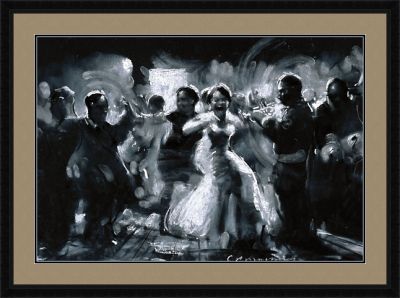 (Image credit Charlie Mackesy)
(Image credit Charlie Mackesy)
What are the worst things in the world? What are the things that run directly contrary to what we are made for? Peter Kreeft has a suggestion: boredom and loneliness (from his talk Lost in the Cosmos). This makes sense, because at the heart of all reality – at the heart of everything we are made for – is the Trinity: unending, ecstatic love, which is anything but boring and lonely.
Now, look out your window or into your own home or into your own soul – do you see any boredom and loneliness…? Sadly, like a wet, hot dumpster, our world (and, we must admit, our own hearts) reek with the ‘worst of things.’ Why? For this post, only one reason will be explored; a paramount problem that is one of the biggest challenges of our times: a lack of community.
So quipped Jane Curtin in the legendary SNL skit, Point/Counterpoint. She was referencing mostly romantic relationships, but let’s expand it to a broader view of basic human-human relationships. Does the nature of human relationships change? It would seem just the opposite of Jane’s claim is true: the more ‘times change’ the more things stay the same. We are not titans – individuals fit to conquer and thrive if left to ourselves.
We are, by our very nature, interiorly impoverished; ever in need of a labyrinthine webbing of others to bring us out of the curvatus in se (curving inward on oneself) that St. Augustine and Dante showed to be the very essence of Hell. For this reason, no man (if he is to remain a man) can be an island. We are made for love and “love can be kept only by being given away” (No Man Is An Island, Thomas Merton.)
Yet in our society today it is a fact as cold as steel that this webbing of others – this sense of community – is increasingly hard to find.
Perhaps this is true especially for the young adult demographic. In the recently published article, “Alone in the New America” (well worth a read), authors David and Amber Lapp chronicle “the alienation of young working people.” In the midst of heavy debt and beleaguering, widespread, epidemic family fragmentation, most Millenials have embraced a “go-it-alone ethic” in which “there is no sense of ‘we.’” Instead:
“They learn to approach others with suspicion and distrust… thinking of themselves as strangers to each other in their struggles… They just come to work and just cope.”
This quote perhaps sums it up best:
“I don’t think there’s a thing we can do about it,” said Anthony. “And that’s kind of the American way – this is a free country, and free this and free that. But it’s your life, and not too many people care about other people’s lives. As long as it’s not theirs, they don’t care.”
Preeminent scholars, Charles Murray, who has been called “arguably the most consequential social scientist alive,” and Robert Putnam, a public policy professor at Harvard, have painted this rather sobering picture in their books Coming Apart and Bowling Alone, respectively. The long and short of it is this: on a national level (and most strikingly in particular populations) “the raw material that makes community even possible has diminished so much… that the situation may be beyond retrieval.” Blame the media, blame technology, blame work – whatever the reason: our “social capital” has plummeted, deeply affecting our ability to form and join into vibrant communities.
One would venture to guess that this is all anecdotally confirmed by our own experiences. When was the last time you saw hoards of kids playing with each other in a neighborhood? When was the last time you interrupted someone’s family dinner? When was the last time you saw two total strangers interact with each other on the street? And just think of how many inventions of the past decades have replaced regular opportunities for human-human interaction, right down to buying groceries and cooking food (charmingly depicted recently by the season opener of Downton Abbey).
This may sound like a caricatured, nostalgic response but it is a) empirically verifiable and b) hard to deny that it’s ‘easy’ nowadays for people to live without sharing common experiences, memories, activities and life with a consistent group of people. This is the very essence of community and it is rupturing. To drive it home, consider this chilling remark from a priest at an ordinary parish in southeastern Michigan:
I don’t know where everybody is. I don’t see anybody anymore and I don’t know where to find them.
Yes, that’s heavy stuff.
It gives “subject to futility” (Rom 8:20) a whole new look. If you’ve read this far, it can seem like the darkness is getting darker. But the light is getting lighter!
Do not abandon yourself to despair. We are the Easter people; and ‘Alleluia!’ is our song! (Pope John Paul II)
Set firmly in the beating heart of Christ, we can be confident and without fear. He reigns supreme over any problem that might seem insurmountable. And, what’s more, he wants us to live in this world – not out of it. He has a way for us to witness to the world of the gift that is freely given: His Mercy, His Love… Himself. How will He have us witness to the world while living in the world? No doubt: in the context of Christian community.
It is not good that the man should be alone… (Gen 2:18)
For where two or three are gathered in my name, there am I in the midst of them (Matt 18:20)
…and I, when I am lifted up from the earth, will draw all men to myself. (John 12:32)
When did the Lord ever ask anyone to go-it-alone? When has He moved in history if not in a group that had a sense of ‘we?’ Even Abraham had Lot, Moses had Aaron, Mary had Joseph, Paul had Timothy, etc. God gathers to Himself a people, which is very different from merely calling a bunch of individual persons. As deeply affected by our environment as we are, we need the constant contact, support and inspiration of a people if we are to thrive, grow in holiness and succeed in mission.
Most Catholics in this country (like most people in this country in general) need to be more intentional about this. We don’t need people only to ‘chillax’ with as a means of getting our ‘fix’ of human contact. We need brothers and sisters – fellow disciples we can sharpen and be sharpen by, count on, lean into and love. (Note: recall the verse above: “Where two or three are gathered in my name…” – true community requires presence, going far and above just ‘connecting’ through the Internet.) We need to be accountable to others; we need others to point out our weaknesses and strengths; we need intertwined threads if we are to levee the cold. As a rather wise Karol Wojtyla once noted, it is only the vibrancy of solidarity “that allows man to find the fulfillment of himself in complementing others” (pg. 285, Person and Act).
 So, in short, we all need to find and mature in this kind of community. The walk of a disciple (both in terms of holiness and mission) is just about impossible without it. And it is equally as unlikely for any standard pagan walking the streets about you to ‘hear’ the Gospel if they don’t first ‘see’ how we love and are loved by one another (John 13:35). As the authors of “Alone in The New America” once again note:
So, in short, we all need to find and mature in this kind of community. The walk of a disciple (both in terms of holiness and mission) is just about impossible without it. And it is equally as unlikely for any standard pagan walking the streets about you to ‘hear’ the Gospel if they don’t first ‘see’ how we love and are loved by one another (John 13:35). As the authors of “Alone in The New America” once again note:
And it becomes apparent that these young adults need opportunities for communion: to share their stories in supportive communities, to name and to share their suffering, and to receive healing. The remedy for their alienation is the experience of solidarity, of being with others, of forging ties. (Emphasis added.)
In the Christian life, we are never meant to walk alone.
50 Shades of Disorientation
(Image credit Charlie Mackesy)
Recently, on the ‘luv’-soaked occasion of Valentine’s Day, Facebook announced that they will allow users in the United States to choose a ‘custom gender option’ in which one may select from 50 genders, alternatives to the traditional ‘male’ and ‘female’ options. Among the choices are ‘transgender,’ ‘cisgender,’ ‘gender fluid,’ ‘gender neutral’ and ‘neither.’ Their reasoning, you ask?
When you come to Facebook to connect with the people, causes, and organizations you care about, we want you to feel comfortable being your true, authentic self (from the Facebook Diversity page).
This latest cultural exhibition of gender confusion really is nothing new, it is just the next step in man’s rebellion against God along the unhinged-from-reality, Bataan Death March-like excursion into nothingness. This is a manifestation of a problem as ancient as sin. But, still, there is something big that is happening with Facebook’s decision – showing that this problem is still as fresh as a wound.
Where does all this gender confusion stem from?
As a start, it is worth considering that the only reason Facebook would offer 50 gender choices as a way of liberating people to be their “true, authentic self” is if a person’s body is not really part of their self (a concept in philosophical language referred to as body-self dualism). If that outlook is true, what follows?
Well, based on my feelings, consciousness and whatever else makes up ‘me,’ I can manipulate, use, dictate, shape and otherwise rule this machine in which ‘the real me’ is housed. This is one step, but it gets worse. Not only do I not have to ‘listen’ to the nature of my body, but, given the disappearance of God from the human horizon, then I really have no inherent nature that informs what is good or bad for me. Thus, the rampant acceptance of, as George Weigel phrases it,
…the utter plasticity of the human condition: there is nothing given in men and women, not even their gender; all is malleable; all can be changed to fulfill desires (or, as it is usually phrased, to meet the ‘needs’) of the imperial autonomous Self (pg. 44, Evangelical Catholicism).
In short, we are alone in a hostile jungle with two options – die or rule: rule over our bodies; rule over anyone who threatens my self-creation; rule over reality itself. This is the affirmation of nothingness.
Now doesn’t this picture make a lot more sense?
Year after year, this way of thinking has been tightening its grip over our once Creation-affirming culture. But a monolith such as Facebook now trumpeting this worldview as a matter of their company’s foundational ethos is really a big blow.
Why is this an important step?
For a billion people around the world, Facebook is the hub of culture. It is where they connect with people, learn about themselves and receive a hundred cues a day about how life is lived. It is their temple. It is where they come to engage, to listen, to connect and to speak. Like monks, who, as a way of centering their life, periodically ‘check in’ with God every couple of hours, Facebook users must return multiple times daily just to ‘check in.’ It provides a near-monastic rhythm of life.
As this temple, Facebook is a remarkably and insidiously powerful teaching entity – probably the biggest in the world, when it comes right down to it. And the real shame of their recent moment of gender politik is that now every 14 and 15 year-old who makes a Facebook will be considering, “Wait, which one of these genders am I, really? Where do I actually fit on this continuum? I’m not so sure…” The mindset from the get-go is, “You are not given. You must create yourself.” The idea that my body is really me and that there is a givenness (a ‘whatness’) to who I am that informs me of what is good for me and what isn’t… that idea? Implicitly ‘un-friended.’
Why is any of this bad? Because it hurts people. It leads not to human flourishing, but to human suffering. If people stew in a culture that says their body is not part of their ‘true self,’ then they will forever be in a cracked, dissonant war within themselves. Moreover, if people stew in a culture that says, ‘There is nothing that is inherently bad or good for you,’ then eventually more and more people will live that way (I dare you, go to any college and see if that is the case), making more and more people blind to what is good for them and enslaved to poisons. So, in effect, to the classically beautiful definition of a ‘good society’ given by Peter Maurin and Dorothy Day – “a ‘good society’ is one in which it is easy to be good” – people will naturally respond, “that’s threatening.” That’s chilling.
What does one say? We might as well let Pope Benedict XVI say it for us:
The real problem at this moment of our history is that God is disappearing from the human horizon, and, with the dimming of the light which comes from God, humanity is losing its bearings, with increasingly evident destructive effects.
One is also reminded of the legendary quote from Dostoyevsky, which so succinctly illuminates an unwavering truth about life and what it means to be human:
If God does not exist, everything is permitted (The Brothers Karamazov).
Nothing seems to be more and more evidently vindicated each and every day than these two statements. We are losing our bearings (our grip), because we’re walking in the dark. Once God is erased from the “human horizon,” we stumble around for want of light, direction and purpose, desperately and impossibly trying to create ourselves out of nothing and save ourselves from annihilation.
No one would say that Facebook is in voluntary cahoots with the devil, and that won’t be claimed here either. But, our Holy Father nailed it when talking about this mass gender confusion:
Let’s not be naive, we’re not talking about a simple political battle; it is a destructive pretension against the plan of God. We are not talking about a mere bill, but rather a machination of the Father of Lies that seeks to confuse and deceive the children of God.”
Lived-out lies lead to slavery. What are we (you and I) doing to help people not fall victim to this vacuous disorientation?

